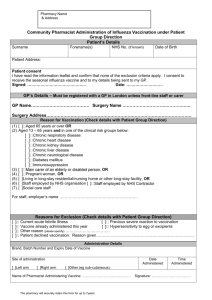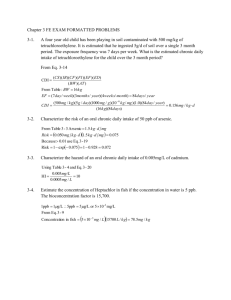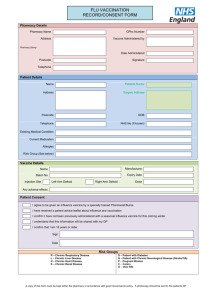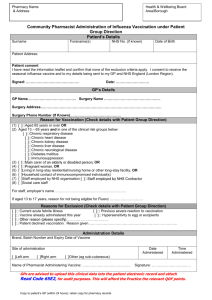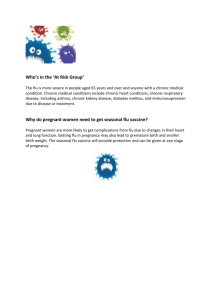Healthy Lifestyle Habits – Females
advertisement
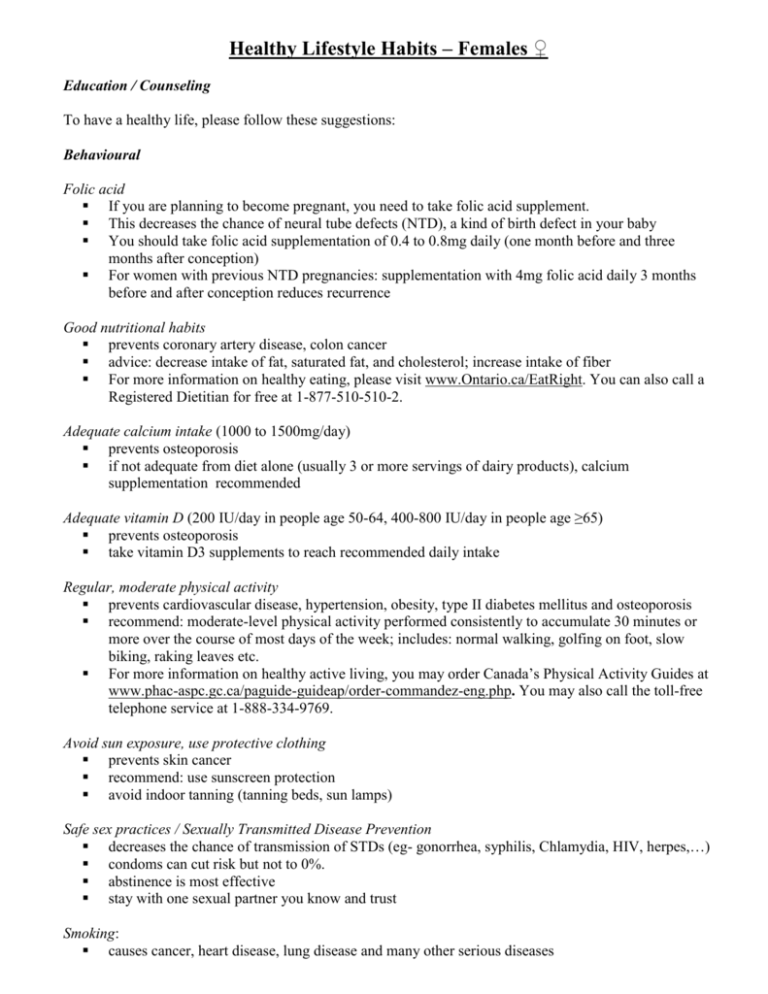
Healthy Lifestyle Habits – Females ♀ Education / Counseling To have a healthy life, please follow these suggestions: Behavioural Folic acid If you are planning to become pregnant, you need to take folic acid supplement. This decreases the chance of neural tube defects (NTD), a kind of birth defect in your baby You should take folic acid supplementation of 0.4 to 0.8mg daily (one month before and three months after conception) For women with previous NTD pregnancies: supplementation with 4mg folic acid daily 3 months before and after conception reduces recurrence Good nutritional habits prevents coronary artery disease, colon cancer advice: decrease intake of fat, saturated fat, and cholesterol; increase intake of fiber For more information on healthy eating, please visit www.Ontario.ca/EatRight. You can also call a Registered Dietitian for free at 1-877-510-510-2. Adequate calcium intake (1000 to 1500mg/day) prevents osteoporosis if not adequate from diet alone (usually 3 or more servings of dairy products), calcium supplementation recommended Adequate vitamin D (200 IU/day in people age 50-64, 400-800 IU/day in people age ≥65) prevents osteoporosis take vitamin D3 supplements to reach recommended daily intake Regular, moderate physical activity prevents cardiovascular disease, hypertension, obesity, type II diabetes mellitus and osteoporosis recommend: moderate-level physical activity performed consistently to accumulate 30 minutes or more over the course of most days of the week; includes: normal walking, golfing on foot, slow biking, raking leaves etc. For more information on healthy active living, you may order Canada’s Physical Activity Guides at www.phac-aspc.gc.ca/paguide-guideap/order-commandez-eng.php. You may also call the toll-free telephone service at 1-888-334-9769. Avoid sun exposure, use protective clothing prevents skin cancer recommend: use sunscreen protection avoid indoor tanning (tanning beds, sun lamps) Safe sex practices / Sexually Transmitted Disease Prevention decreases the chance of transmission of STDs (eg- gonorrhea, syphilis, Chlamydia, HIV, herpes,…) condoms can cut risk but not to 0%. abstinence is most effective stay with one sexual partner you know and trust Smoking: causes cancer, heart disease, lung disease and many other serious diseases should try best to quit, ask your doctor for help in quitting. Medications can double or triple your quitting success rate. dietary advice: eat an average of seven portions of green leafy vegetables or fruit per week to lower risk of lung cancer Alcohol: harmful effects if drink more than 1-2 drinks per day if you drink more than that and have trouble cutting down or quitting, ask your doctor for help Elderly ask your doctor for full assessment if you are getting forgetful ask your doctor for full assessment if you are falling repeatedly Oral Hygiene: prevents periodontal disease, and oral cancer brushing / flossing teeth after each meal: flossing teeth prevents gingivitis in adults; brushing teeth is essential in the application of fluoride dentifrice to prevent dental caries and gingivitis fluoride (in toothpaste / in water / in supplement): daily use gives significant reductions in tooth decay tooth scaling and prophylaxis: intensive professional oral hygiene and prophylaxis prevents chronic gingivitis and periodontitis stopping smoking: reduces the risk of oral cancer Personal safety wear seat belts: prevents injury from motor vehicle collisions wear helmets when biking, playing sports with risk of head injury noise control / hearing protection / no loud music to prevent hearing loss Parents with children < 15 years of age poison control prevention: lock away all harmful/ poisonous substances. Know poison control centre phone number 416 813 5900 child proof home have working smoke detectors, non-flammable sleepwear and hot water thermostat setting of <54C Immunizations Tetanus vaccine need routine booster doses every 10 years if had primary series adults without a primary series need three doses primary adult series are given at time 0, 1-2 months, and 6-12 months. Influenza vaccine need annual immunization High risk group: ≥65 years of age, chronic cardiac or pulmonary disorders, chronic diseases, traveling to places where the virus is likely present, health care workers, personnel in contact with people in high-risk groups, household contacts of a high risk person Varicella vaccine, varicella immunity (Chickenpox) Tell your doctor if you have had chickenpox. If not, ask for blood test to see if you need 2 varicella (chickenpox) vaccinations Vaccine administered to women of childbearing age, health care workers, household contacts of immunocompromised people, people exposed at work, new immigrants from tropical climates need 2 doses at least 4 weeks apart, if ≥13 years Pneumococcal vaccine Needed in high risk groups: sickle cell disease, asplenia, splenic dysfunction, chronic cardiorespiratory disease (except asthma), cirrhosis, alcoholism, chronic renal disease, nephritic syndrome, diabetes mellitus, chronic CSF leak, HIV infection, smokers all persons ≥65 years Acellular pertussis vaccine(Adacel) single dose of acellular pertussis vaccine to all adults who have not received a dose in the past (not covered by government, about $45) Human papilloma virus vaccine decreases chance of getting genital warts and cervical cancer for females between 9 and 13 years benefit females between 14 and 26 years of age even if already sexually active give 3 doses at 0, 1, and 6 months $150/dose, $450/3 doses grade 8 girls get it free in school Investigations / Labs Mammography with Clinical Breast Exam age 50-70, screen every 1-2 years for breast cancer (may consider for women aged 40-49) earlier if family history of breast cancer Colorectal cancer screening of patients ≥ 50 years Hemoccult multiphase (stool occult blood test) every 1-2 years OR flexible sigmoidoscopy OR colonoscopy Cervical cytology (Pap test) to screen for invasive cervical carcinoma annual screening following initiation of sexually activity or age 18 to age 70 after 2 normal smears, screen every 3 years Screening for sexually transmitted infections high risk populations: age <30 with at least 2 sexual partners, age 16 at first intercourse, prostitutes etc Syphilis (serology testing) Gonorrhea (screen with Gram stain and culture of cervical or urethral specimen) Chlamydia (screen with culture or polymerase chain reaction) HIV (screen with blood test) Hepatitis B virus (screen with hepatitis B surface antigen (HBsAg) in blood Audioscope (hearing test ) 65 years and older; inquire / whispered voice test Fasting lipid profile (total cholesterol, HDL-C, triglyceride and LDL-C) screen women who are postmenopausal or >50 screen adults with risk factors (diabetes mellitus, smoker, hypertension, abdominal obesity, family history of premature coronary artery disease, hyperlipidemia, exertional chest discomfort, dyspnea, erectile dysfunction, chronic kidney disease, atherosclerosis, major CAD risk factors) screening frequency every one to three years or sooner. Target: • High risk: LDL <2.0mmol/L; total cholesterol to HDL-C ratio <4.0 • Moderate risk: LDL <3.5mmol/L; total cholesterol to HDL-C ratio <5.0 • Low risk: LDL <5.0mmol/L; total cholesterol to HDL-C ratio <6.0 Fasting blood glucose screen for type II diabetes mellitus, done every 3 years in adults ≥40 years of age; screen more frequent with risk factors (first degree relative with DM, presence of complications associated with DM, hypertension, dyslipidemia, overweight, abdominal obesity, member of high risk population (Aboriginal, Hispanic, Asian, South Asian or African descent), history of impaired glucose tolerance or impaired fasting glucose, vascular disease, history of gestational DM or macrosomic infant, schizophrenia, polycystic ovarian syndrome) FBS ≥7.0 mmol/L is diagnostic of diabetes mellitus screen to prevent cardiovascular events and death Bone mineral density screen for osteoporosis, to prevent fragility fractures screen all postmenopausal women age >65 OR screen if have one of: vertebral compression fracture, fragility fracture after age 40, family history of osteoporotic fracture, systemic glucocorticoid therapy of >3 months duration, malabsorption syndrome, primary hyperparathyroidism, propensity to fall, osteopenia apparent on x-ray film, hypogonadism, early menopause (<45 years) OR screen if have 2 of: rheumatoid arthritis, past history of clinical hyperthyroidism, chronic anticonvulsant therapy, low dietary calcium intake, smoker, excessive alcohol intake, excessive caffeine intake, weight <57 kg, weight loss >10% of weight at age 25, chronic heparin therapy Depression Screening 1) Over the past 2 weeks, have you felt little pleasure in doing things? 2) Over the past 2 weeks, have you felt down, depressed or hopeless? Positive screen is a yes answer to one or both questions. Please inform your doctor if positive. If you have any questions on any of the above, please ask. Please keep track of the tests and treatments you should have and inform us if you need any of them. Remember your health is your responsibility. Dr Tat-Kwan Wong, Dr T K Wong Medicine Prof. Corp. #402, 2830 Keele St. Toronto, ON M3M 3E5 Tel & Fax: 416 633 7337 Updated June 4, 2010
